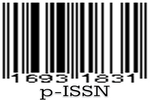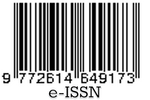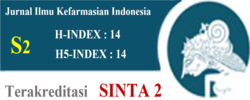Public perception of COVID-19 vaccination in Banjar District, Indonesia: the role of sociodemographic factors
Abstract
Coronavirus Disease 2019 (COVID-19) is an infectious disease caused by the Severe Acute Respiratory Syndrome Coronavirus-2 (SARS-Cov-2) virus. Vaccination is one way to prevent the spread of the COVID-19 virus. One of the factors causing the low acceptance of COVID-19 vaccination in the community is the perception of COVID-19 vaccination. Socio-demographic factors such as age, gender, occupation, last degree of education, and monthly income have a substantial relationship with public perceptions of COVID-19 vaccination. The purpose of this study was to analyze public perceptions of COVID-19 vaccination. This study used an analytical observational method with a cross-sectional study design. The sample in this study used a consecutive sampling technique, totaling 400 people. The majority of respondents had a enough good perception of COVID-19 vaccination. There is a relationship between socio-demographic factors of age, occupation, last degree of education, and monthly income with people's perceptions of COVID-19.
References
[2] Pedoman Pencegahan dan Pengendalian Corona Virus Disease (Covid-19), Kementerian Kesehatan Republik Indonesia. 2020.
[3] Supriyatna, E., “Wabah Corona Virus Disease Covid-19 dalam Pandangan Islam”, Jurnal Sosial dan Budaya Syar-i., vol.7, no.6, pp. 555-564, 2020.
[4] Sutrayanti, N., Menyemai Benih Dharma Perspektif Multidisiplin. Makasar: Ahmar Cendikia Indonesia Foundation, 2020.
[5] Kementerian Kesehatan Republik Indonesia, “Situasi Emerging Corona Disease 2019”. [Online]. Available: https://covid19.kemkes.go.id/category/situasi-infection-emerging/info coronavirus /#.X6VXjsTiK00, [Accessed November 20, 2021].
[6] Kementerian Kesehatan Republik Indonesia. “Vaksinasi Covid-19 Nasional”. [Online]. Available: https://vaksin.kemkes.go.id/#/vaccines [Accessed November 20, 2021].
[7] Généreux, M., et al., “Communication Strategies and Media Discourses in the Age of COVID-19: An Urgent Need for Action”, Health Promotion International, vol. 36, no.4, pp. 1178-85, 2021.
[8] Argista, Z., “Persepsi masyarakat terhadap vaksin Covid-19 di Sumatera Selatan”, Undergraduate Thesis, Faculty of Public Health, Sriwijaya University, 2021.
[9] Al-Mohaithef, M.; Padhi, BK “Determinants of COVID-19 Vaccine Acceptance in Saudi Arabia: A Web-Based National Survey”, J. Multidiscip. Health c., vol. 13, pp. 1657–63, 2020.
[10] Almaghaslah, D.; Alsayari, A.; Kandasamy, G.; Vasudevan, R. “COVID-19 Vaccine Hesitancy among Young Adults in Saudi Arabia: A Cross-Sectional Web-Based Study”, Vaccines, vol. 9, no. 330, pp. 1-8, 2021.
[11] Alabdulla, M.; Reagu, SM; Al-Khal, A.; Elzain, M.; Jones, RM, “COVID-19 vaccine hesitancy and attitudes in Qatar: A national cross-sectional survey of a migrant-majority population”, Influenza Other Respir. Viruses, vol. 15, pp. 361–70, 2021
[12] Callender, D. “Vaccine hesitancy: More than a movement”, Hum. Vaccines Immunother, vol. 12, no.9, pp. 2464–8, 2016.
[13] Harrison, EA; Wu, JW, “Vaccine confidence in the time of COVID-19”, Eur. J. Epidemiol, vol.35, pp. 325–30, 2020.
[14] Lin, Y.; Hu, Z.; Zhao, Q.; Alias, H.; Danaee, M.; Wong, LP, “Understanding COVID-19 vaccine demand and hesitancy: A nationwide online survey in China”, PLoS Negl. Trop. Dis, vol.14, no.12, pp. e0008961, 2020.
[15] Schaffer Deroo, S.; Pudalov, NJ; Fu, LY, “Planning for a COVID-19 Vaccination Program”; American Medical Association: Chicago, IL, USA, vol.323, no.24, pp. 2458-9, 2020.
[16] Arikunto, S., Prosedur Penelitian: Suatu Pendekatan Praktik. Jakarta: Rineka Cipta, 2013.
[17] Djola, R., “Hubungan Antara Tingkat Pendapatan Keluarga dan Pola Asuh dengan Status Gizi Balita di Desa Bongkudai Kecamatan Modayag Barat”, Undergraduate Thesis, Sam Ratulangi University School of Public Health, 2011.
[18] Tasnim, “Faktor-Faktor yang Berhubungan dengan Persepsi Tenaga Kesehatan terhadap vaksin Covid-19 di Puskesmas X Tahun 2020”, Jurnal Kesehatan Masyarakat, vol. 3, no.1, pp. 167-75, 2021.
[19] Amelia, R.; Wijaya, H. ; Harahap, J. ; Rusdiana, R., “Citizens’ perception of and willingness to receive COVID-19 vaccination in Medan, Indonesia”, IJID Regions., vol. 8, pp. S39–43, 2023.
[20] Al-Zalfawi, S.M.; Rabbani, S.I.; Asdaq, S.M.B.; Alamri, A.S.; Alsanie, W.F.; Alhomrani, M.; Mohzari, Y.; Alrashed, A.A.; AlRifdah, A.H.; Almagrabe, T., “Public Knowledge, Attitude, and Perception towards COVID-19 Vaccination in Saudi Arabia”, Int. J. Environ. Res. Public Health, vol.18, no.10081, pp. 1-15, 2021.
[21] Oche, O.M., Adamu, H., Yahaya, M., Illo, H.G., Danmadami, A.M., Ijapa, A., et al., “Perception and willingness to receive COVID-19 Vaccines: A cross-sectional survey of the general population of Sokoto State, Nigeria”, PLOS ONE., vol. 17, no.12, pp. 1-16, 2022.
[22] Wulandari, D., et al., “Factors Associated with Health Workers' Perceptions of the COVID-19 Vaccine at Puskesmas X in 2020”, Journal of Public Health., vol. 9, no.5, pp. 660-8, 2021.
[23] Subedi, D.; Pantha, S.; Subedi, S.; Gautam, A.; Gaire, A.; Sapkota, D.; Sapkota, S.; Kandel, M.; Parajuli, A.; Ghimire, H.; et al., “Perceptions towards COVID-19 Vaccines and Willingness to Vaccinate in Nepal, Vaccines, vol.9, no.12, pp. 1448, 2021.
[24] Arifin, Z., Evaluasi Pembelajaran, Bandung: PT Remaja Rosdakarya, 2012.
[25] Elhadi, M. et al., “Knowledge, attitude, and acceptance of healthcare workers and the public regarding the COVID-19 vaccine: a cross-sectional study”, BMC Public Health, vol. 955, no.21, pp. 1–21, 2021.
[26] Suhadi., et al., “Hubungan Persepsi Masyarakat dengan Penerimaan Vaksin Covid-19 di Kecamatan Wua Wua Kota Kendari Tahun 2021”, Hospital Majapahit, vol. 14, no.1,pp. 131-40, 2022.

This work is licensed under a Creative Commons Attribution-NonCommercial-ShareAlike 4.0 International License.
Licencing
All articles in Jurnal Ilmu Kefarmasian Indonesia are an open-access article, distributed under the terms of the Creative Commons Attribution-NonCommercial-ShareAlike 4.0 International License which permits unrestricted non-commercial used, distribution and reproduction in any medium.
This licence applies to Author(s) and Public Reader means that the users mays :
- SHARE:
copy and redistribute the article in any medium or format - ADAPT:
remix, transform, and build upon the article (eg.: to produce a new research work and, possibly, a new publication) - ALIKE:
If you remix, transform, or build upon the article, you must distribute your contributions under the same license as the original. - NO ADDITIONAL RESTRICTIONS:
You may not apply legal terms or technological measures that legally restrict others from doing anything the license permits.
It does however mean that when you use it you must:
- ATTRIBUTION: You must give appropriate credit to both the Author(s) and the journal, provide a link to the license, and indicate if changes were made. You may do so in any reasonable manner, but not in any way that suggests the licensor endorses you or your use.
You may not:
- NONCOMMERCIAL: You may not use the article for commercial purposes.
This work is licensed under a Creative Commons Attribution-NonCommercial-ShareAlike 4.0 International License.





 Tools
Tools





















